At Nicewicz Farm in Bolton, a love of peonies brings flower fans together
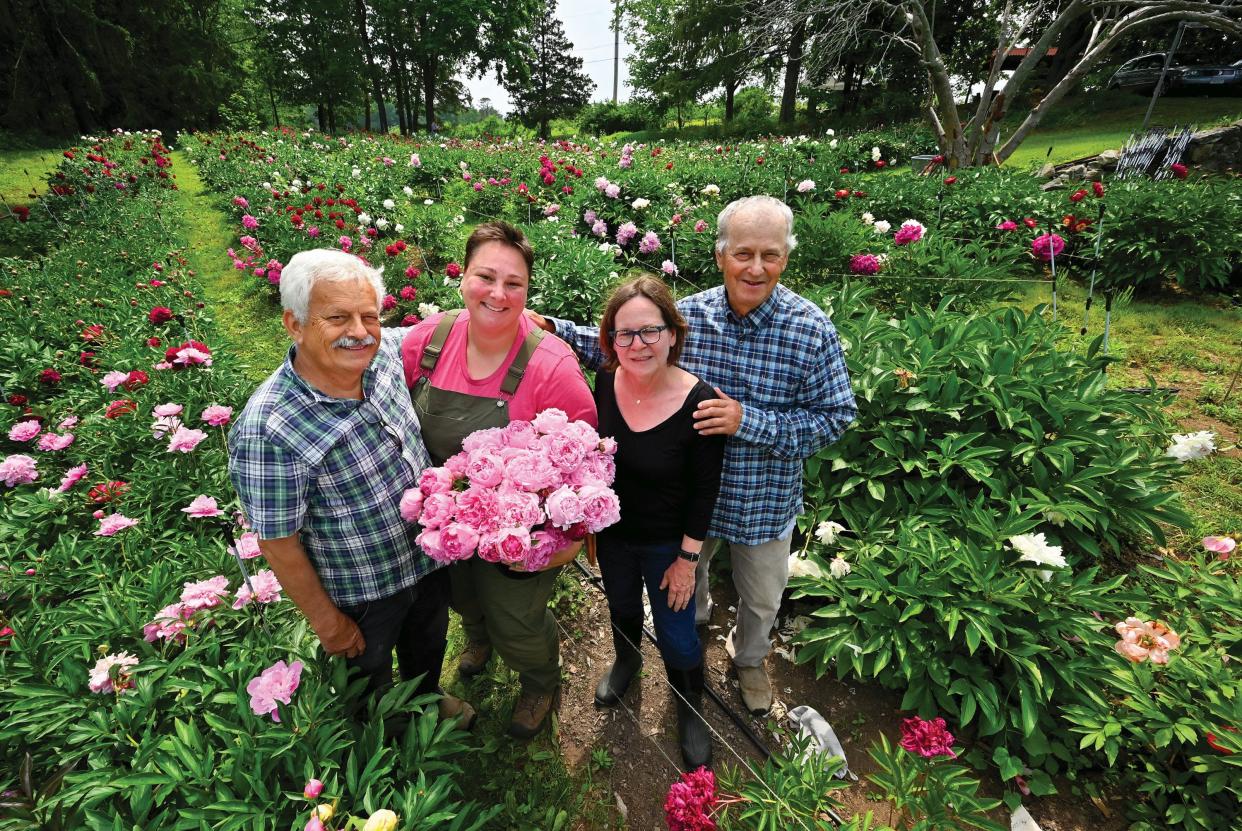
“Everyone who loves peonies has a story about why they do,” said Eugenia Harris, who, with her friends at Nicewicz Farm in Bolton, oversees 2,000 bushes of the beautiful and fragrant flowers that bloom in early June. Many of those stories begin, “My mother grew them.” So it was on the 100-acre Nicewicz Farm, known for its orchards of apples, peaches, pears, plums and nectarines, as well as acres of corn, tomatoes, beans and a variety of squashes.
Four brothers are the third generation to tend the hilltop farm. Vera Nicewicz, their mother, kept a half-dozen peony bushes in her garden. So did Eugenia Harris’ mother, who lived nearby. The Harris and Nicewicz families have been friends for decades, and when Eugenia Harris wanted to expand her own collection of peonies back in 2001, she asked her friend David Nicewicz if she could plant a few on his family’s farm.
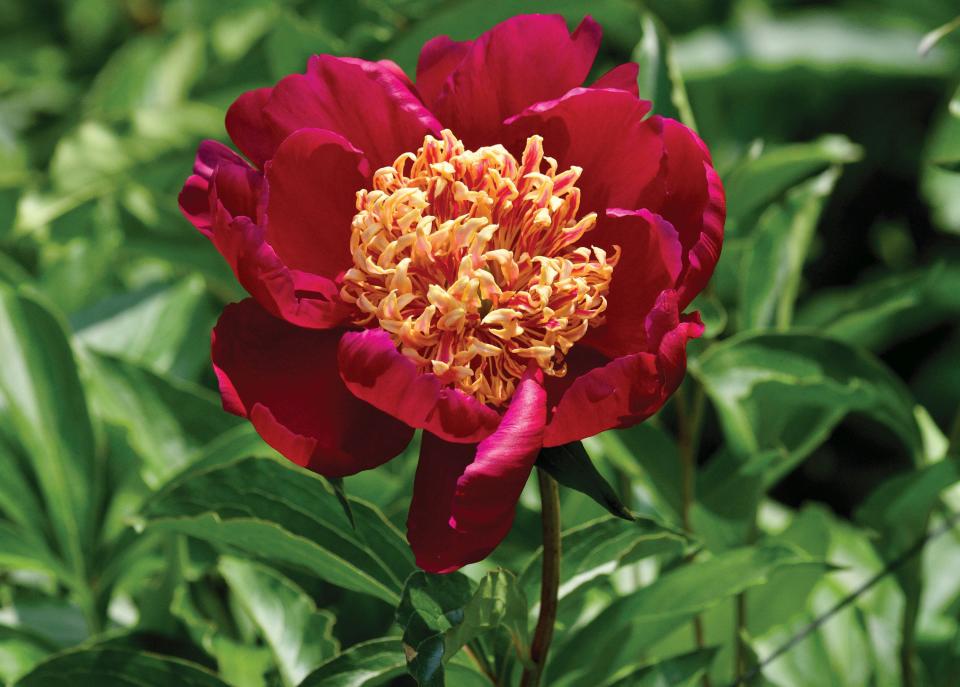
“We started with 75, representing between 30 and 40 varieties of peonies,” said Harris. “We’d give away the blooms to family and friends.” This went on for several years. Then Harris, a software engineer, moved to Austin, Texas. “In the summer of 2015, my sister sent me a picture of the beautiful blooms from our peony plants and I took the next plane back to Massachusetts,” she said.
Harris and Nicewicz planted 800 new peonies in 2016 and have gradually increased their number every year since then. “We took them to the farmers market in Union Square, Somerville, the summer of 2017 and sold every single bouquet,” Harris said.
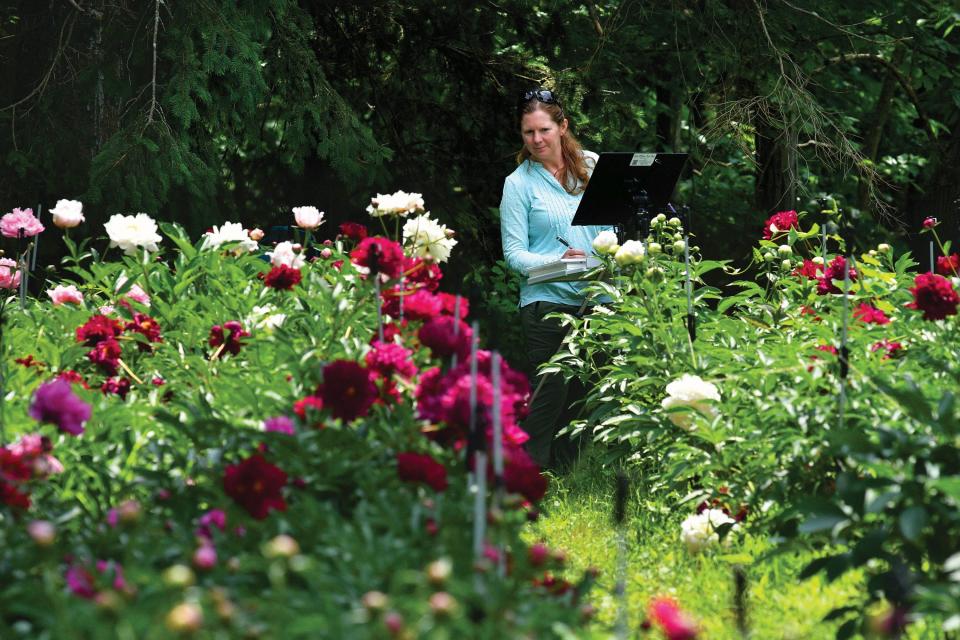
A love of farm and family
Stacey Lee, owner of Paeonia Designs, a floral design studio in Framingham, assists in the Nicewicz peony operation. “I went to the farm as a peony-obsessed florist in search of the best locally grown, sustainable blooms I could find for my clients’ weddings and events,” said Lee. “I met and got along fabulously with Eugenia from the start. We’re both detail-driven people who were engineers before becoming peony farmers, so we have much in common. David is the most welcoming, wonderfully kind and eldest Nicewicz brother. He shares his love for the farm and family history, community and a fresh-dipped ice cream bar with just about anyone who visits.”
Peonies at Nicewicz Farm are raised organically; that means no chemical spraying. They use cinnamon on the roots to prevent fungus, and when the new buds come out, Lee and Harris are on the prowl for signs of botrytis, a fungus that kills young buds. They snip off any dead buds and tosses them into the trash. “You can’t compost them because the fungus will spread,” Lee said.
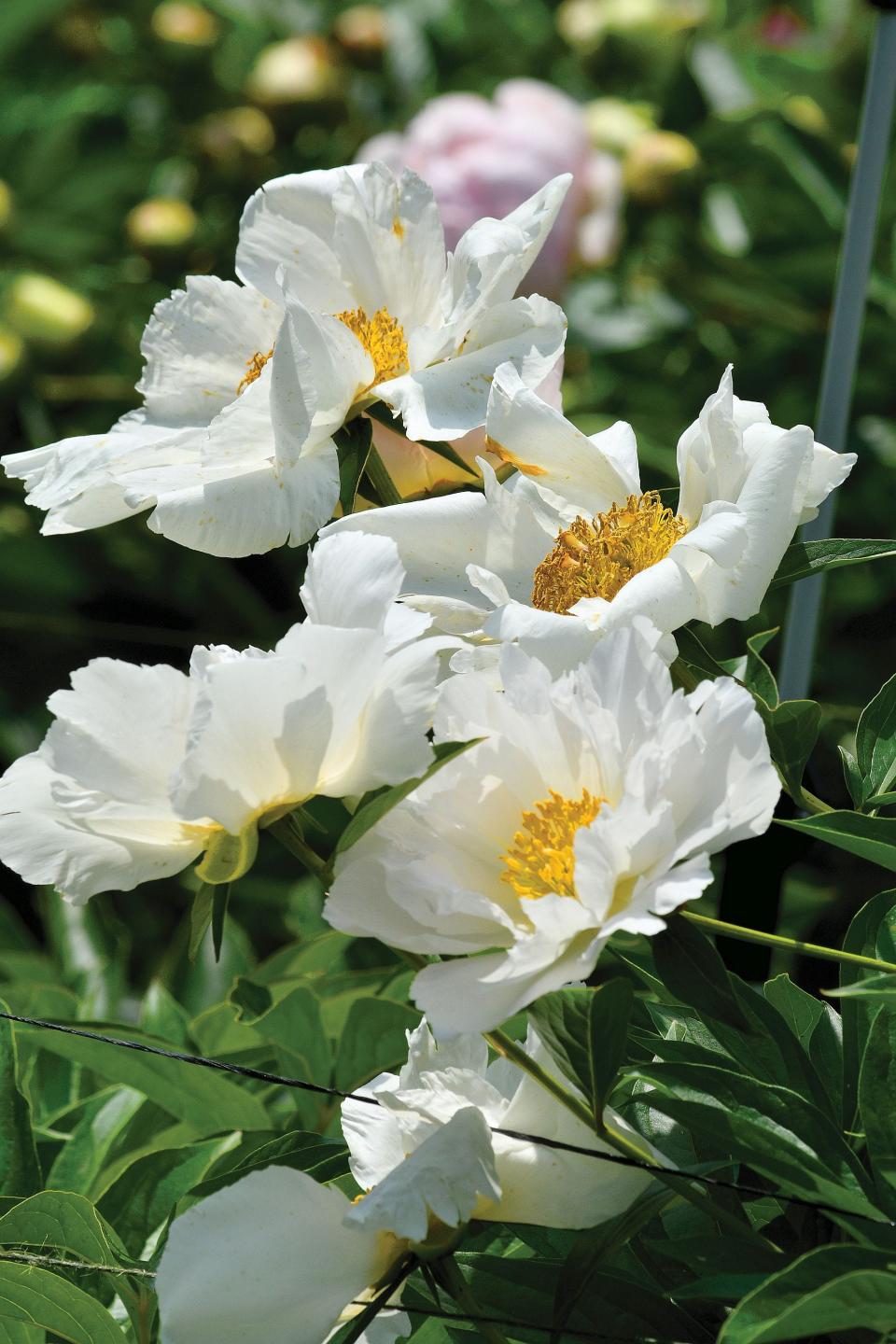
Other than being on guard to prevent fungus, farmers and gardeners alike find that peonies are relatively easy to raise and care for. They need abundant sunshine, good soil and drainage as well as lots of water. Last summer’s wet weather didn't affect the individual blooms too much, according to Lee. “The hilltop farm has fantastic drainage and we were finished harvesting peonies by the end of June, before the unprecedented rain in July started up,” she said.
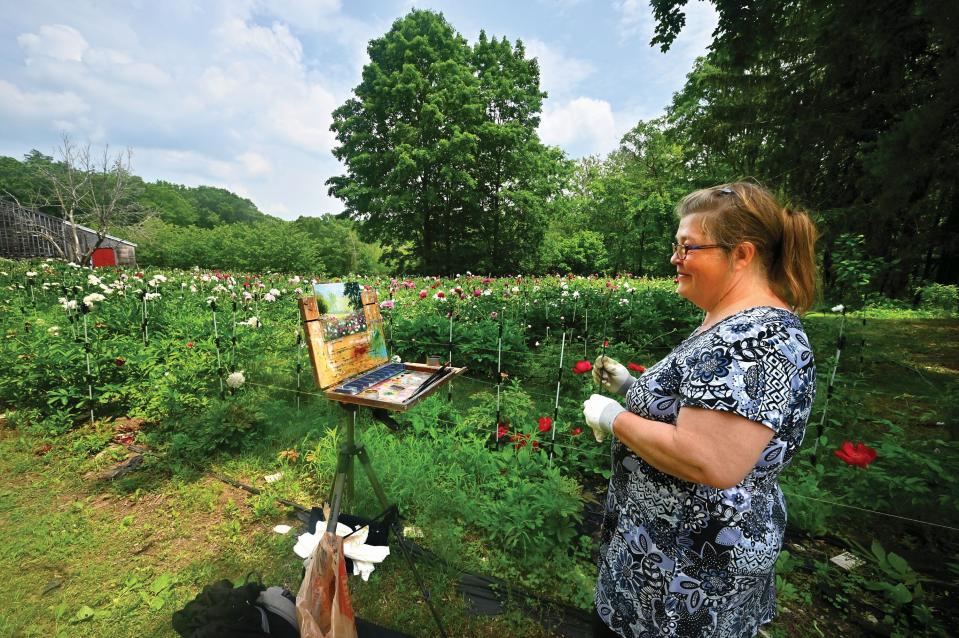
“We typically expect to cut peonies for about three weeks, moving through varieties from the early blooming corals to the late coming whites,” Lee said. “The 2023 season was extended as the peonies came in a bit slower with the cloudy, cool and wet weather in the spring. The weather slowed the usual tidal wave of blooms that come in the dry heat of early summer. Harvesting was a chore at times,” she admitted. “Cutting blossoms from soaked plants in full rain gear can be a challenge.”
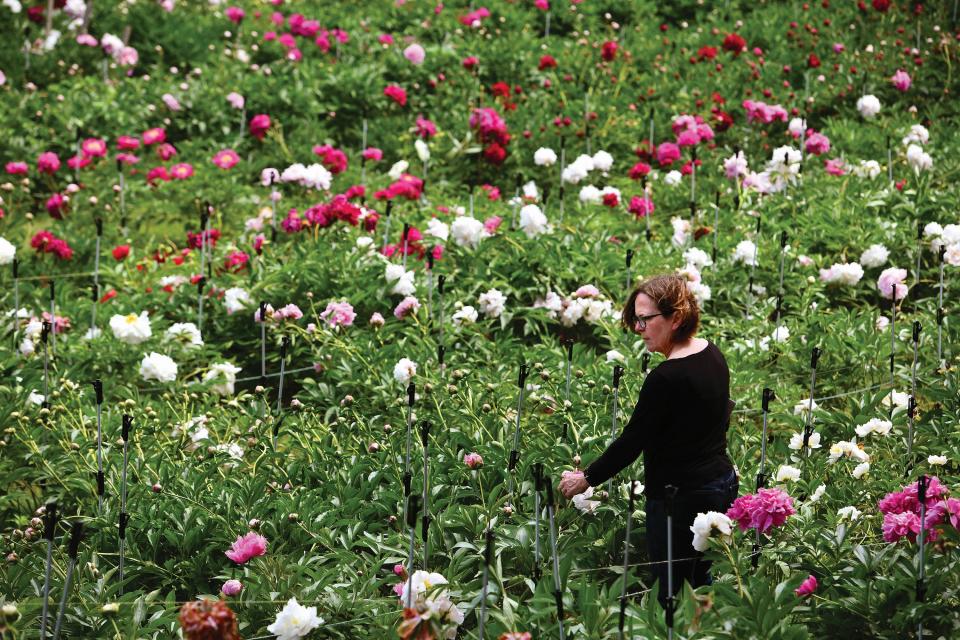
Peonies have historically thrived in the cooler temperatures of the Northeast. “They’re resistant to the cold and in fact need 400 hours of freezing temperatures in the winter,” Harris said.
Most of the peonies grown on Nicewicz Farm are the herbaceous variety. These are the most well-known type that produce frothy blossoms in a range of colors from bright orange to delicate pinks, pale yellows and pristine whites. The farm has a few tree peonies, the giant variety that can grow to 7 feet and produce huge blooms. Itohs, or intersectional peonies, a hybrid cross between tree and herbaceous varieties that produces a shorter-stemmed blossom, also grow on the farm.
One of their oldest of the herbaceous peony plants, the Raspberry Sundae variety, is the most prolific of all the Nicewicz peonies. “We counted 62 blooms on one bush last summer,” Harris said.
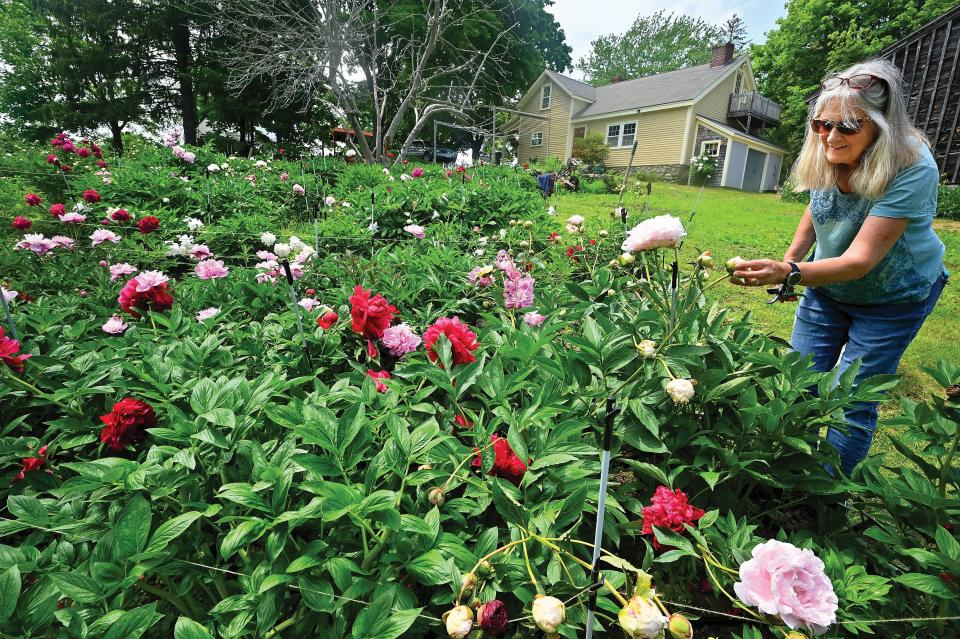
Blooming year after year
All varieties of peonies are perennials and will bloom year after year if they’re planted in full sun in soil with good drainage. The herbaceous variety of peonies at Nicewicz Farm grow from tuberous roots. “You have to be careful in planting them,” Lee said. “Too deep and the plants will struggle to bloom; too shallow and you risk the roots drying out or being damaged by the freeze/thaw cycles of the top layers of soil.” The Nicewicz peonies are planted in soil that has compost mixed in along with a supplement of bone meal. It usually takes three years to produce a blooming bush.
The blooming season for peonies is short and sweet, usually no more than three weeks or so. When they start to bloom there’s a marathon of activity at the farm. With the help of several longtime volunteers, the peony blossoms are cut, bunched and stored in the farm store’s walk-in cooler. When harvesting peonies, the crew is careful to leave three blossoms on each plant to provide nourishment for the roots so the next year’s bush will be full of buds.
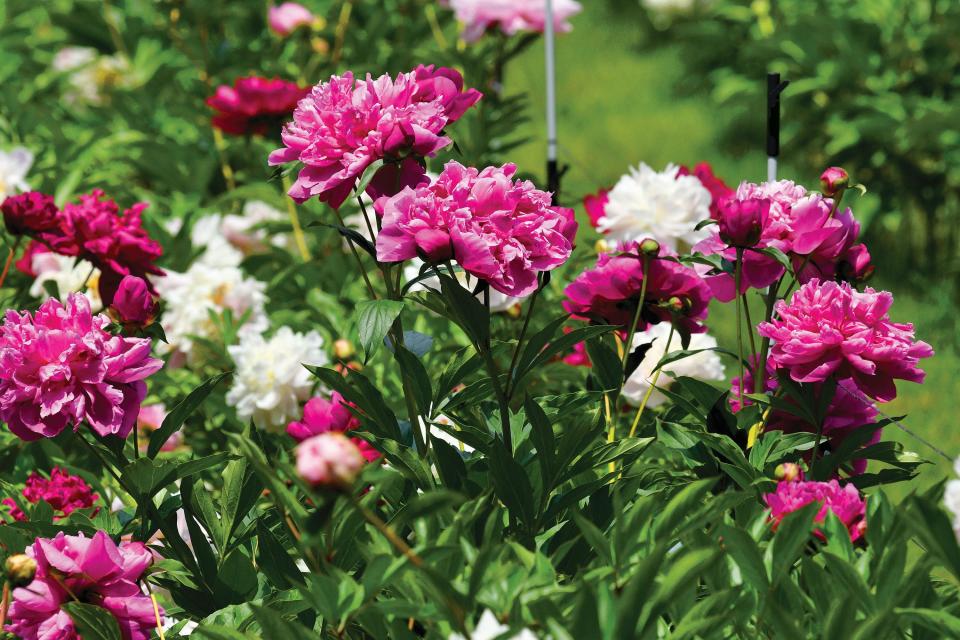
“We pick them at what’s called the marshmallow stage, when the buds are large and squishy,” Harris said. Within hours after resting in water the peonies burst forth into flamboyant blossoms that are sold in bouquets of five stems. There is a small store on the farm and almost as soon as it opens for peony season, there’s a lineup of cars along the driveway driven by longtime customers eager for the annual, showy bouquets. The Nicewicz peonies are sold only in bouquets; the farm is not a pick-your-own operation.
Pitching in to help with the harvest is a tradition at Nicewicz Farm. “Each day brings a different group of folks together for work around the farm and a homemade lunch at the picnic tables under the tent,” said Lee. “From old friends and florists picking up orders to delivery drivers and the mail people, everyone joins in for some good food and always a few laughs after a long morning of work. After several years helping with the harvest on the farm, I can confirm it is one of the most peaceful places I have the privilege of experiencing.”
For information on the 2024 season of peonies at Nicewicz Farm, visit nicewiczpeonies.com or follow them on Instagram @nicewiczpeonies.
.
This article originally appeared on Telegram & Gazette: In full bloom: Nicewicz Farm in Bolton thrives on a love of peonies

